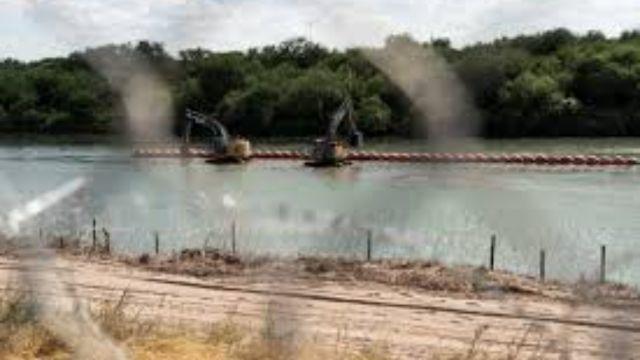MJP –
A new court document asserts that in response to what it calls an “unprecedented invasion of Texas by transnational criminal cartels and potential terrorists,” Texas Governor Greg Abbott erected a floating barrier in the Rio Grande River.
Texas sent thousands of National Guard soldiers and set razor wire along the border as part of Abbott’s March 2021 operation, Lone Star. At the same time, circular saw-like metal sheets have been used to separate big floating buoys in the Rio Grande, which are intended to prevent river crossings.
Texas is facing a lawsuit from the federal government seeking the removal of the barriers. The federal government claims that the state is infringing upon its ability to conduct border patrols.
This is just the latest chapter in Abbott’s ongoing feud with the federal government over his crackdown on Mexican immigration to Texas.

In a federal court in Texas, both parties have submitted briefs outlining their respective plans to present evidence and witnesses.
That Texas “caused the Floating Buoy Barrier to be placed in the Rio Grande River about two miles downstream from the Camino Real International Bridge in Maverick County, Texas, in July 2023″ without first obtaining a permit from the U.S. Army Corps of Engineers is the set of facts that Texas is requesting the court to accept.
SEE MORE –
Start Shopping: Back-to-School Sales Tax Holiday Offers Savings from Today to August 11
Additionally, the Lone Star State is requesting the court to recognize that the floating barrier “has since at least August 31, 2023, been located entirely within the boundaries of the United States of America and the State of Texas.”
According to Texas’s filing, the state is not breaking any laws by not obstructing the “navigable water of the United States.” This is about the Rivers and Harbors Appropriation Act of 1899.
“The Rio Grande River is not navigable within the meaning of the RHA at the location of the Floating Buoy Barrier,” the document says.
It goes on to say that the federal government shouldn’t get an injunction against Texas from the court.
An injunction to dismantle the Floating Buoy Barrier would be detrimental to Texas, its inhabitants and communities, and the nation as a whole, much outweighing the nonexistent harm to commercial navigation caused by the barrier. It argues that the relief the Plaintiff seeks hurts the public interest instead of helping it.
Also included were several suggested displays, one of which was a “video of the segment of the Rio Grande River between River Mile Markers 275.5 and 610.” Another was a “video of the Rio Grande River in the vicinity of Eagle Pass.”
Another video that Texas would want to send is one that was “taken Sep. 20, 2023, in the vicinity of the buoys.”
U.S. filings vehemently disagree with Texas’ contention that it is immune from federal navigable river statutes due to Mexican invasion. U.S. federal attorneys stated in their letter that the concept was “novel” and completely unfounded.
An expert in constitutional law says that Greg Abbott lacks the authority to defy the government.
Border security measures strip Texas of authority while Mexico doubles down on incarcerating undocumented immigrants.
The federal attorneys also raised concerns about Texas’s plan to bring in three experts on navigable rivers.
The US tries to rein in Carlos Rubinstein, Herman Settemeyer, and Kathy Alexander’s cumulative testimony. All three of them will give testimony that is both redundant and cumulative, based on their reports and depositions, and it will all be about the same thing: the purported legal requirements of water rights permitting and the supposed impossibility of changing water preferences under different treaties and laws.
“The United States does not seek to exclude all three of them, but no more than one witness should be necessary to give these opinions,” according to the US government.




